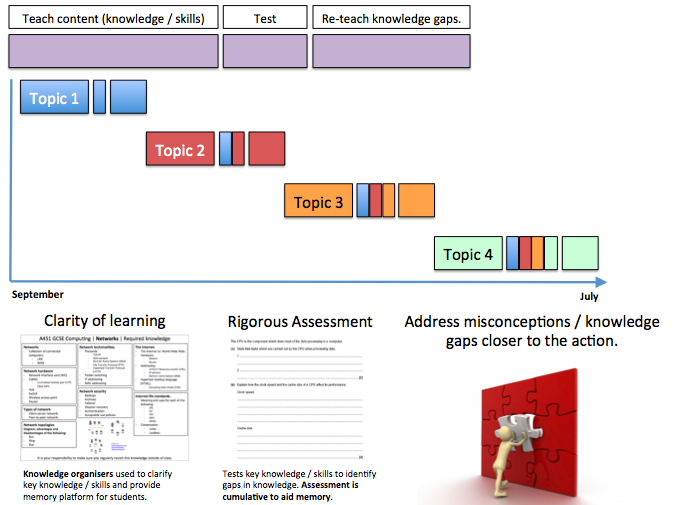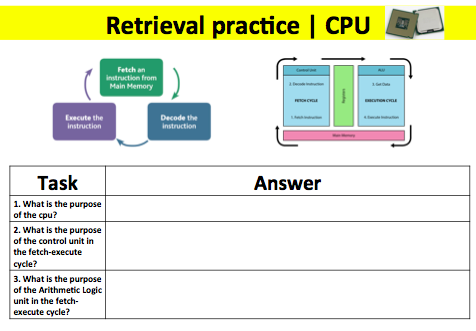Tagged: ofsted
Frequency of feedback – is there a better way?
Marking and feedback is a hot topic at the moment following further guidance from Ofsted that they don’t expect to see a particular type or frequency of marking/feedback on student work – it’s for schools to decide what is the best method to help students improve.


One of the biggest groans from any teacher will be the frequency at which they are expected to mark and give feedback (usually written comments with coloured pen responses) to students. This is generally dictated by a schools marking/feedback policy. Verbal feedback is probably the most useful type of feedback as the frequency of this is relentless on a day to day basis. But what about the frequency of assessed student work…
Should the frequency of feedback be dictated by a central policy?
A quick poll on Twitter suggests this approach is common practice. But are we wrong to adopt this approach?

What are the advantages for dictating the frequency of feedback in a policy?
- It may encourage some consistency and ensure it happens with some regularity.
- It may be easier to check that it’s happening.
What are the potential drawbacks?
- It potentially creates artificial assessment opportunities that meet the frequency (as laid out in school policy) rather than assessing and giving feedback where appropriate to aid and improve learning.
- Its a huge workload for teachers especially in subjects such as humanities where you might teach an entire year group and have to mark / provide feedback for 100s of books every few weeks. The amount of work required here is likely to diminish the effect of feedback.
- It may promote a culture of valuing the evidence of marking / feedback instead of having a broader understanding of how feedback helps students to progress their learning.
- Teachers become confused with the idea that working endless hours to evidence marking (often more than a school policy dictates) is whats requires to show they care about student learning (when it may well be holding it back).
Are we wrong about stipulating the frequency at which teachers mark and give feedback to students? Is this having a detrimental effect on workload and staff wellbeing? Should we allow teachers to mark/feedback more than a policy dictates?
What could we do instead?
What if the frequency of feedback was directed by departments at critical points during sequences of lessons where it will enable teachers to understand more about student performance and enable them to give useful feedback on student performance? This could be planned into a schemes of work by identifying in meticulous detail what will be assessed, how feedback will be communicated and when students will be given time to act on the feedback from the teacher. It might look something like this in the first instance…
Long term (reduce teacher workload increase student learning):

The different colours represent different topics. ‘A’ represent an assessment. ‘F’ represents a lesson dedicated to students acting on feedback. This is just an example to illustrate a point and would require a little more thought!
The long term plan above shows where assessment takes place in sequence with learning over a long period of time rather than every 3 weeks (or some other arbitrary number). This could reduce teacher workload by specifying in detail when assessment, feedback take place (teachers should do no more or less) and potentially make marking/feedback more impactful for student learning. It would give clarity of the amount of marking/feedback to teachers, middle leaders and senior leaders. The focus for development could then be on the quality/effect of the feedback on student learning rather than the amount of feedback given.
These assessments could also be accumulative so that they build knowledge over time:

Short term (reduce teacher workload increase student learning):
- Verbal feedback every lesson, in the moment close to student learning – correcting common misconceptions and modelling great performance /meta-cognitive approaches to tasks.
- Rather than ‘flashy starters’ embed retrieval practice into the beginning of every lesson as routine to help build memory. Teachers can address gaps immediately (whole class feedback), re-teach and ask students to re-draft / improve work every lesson (without having to mark). This also allows you to interleave knowledge over long periods of time (the retrieval practice doesn’t necessarily have to synchronise with the main objective of the lesson).

An example of using retrieval practice at the beginning of a lesson. Testing knowledge from 3 weeks ago. Another strategy could be to ask 3 questions based on… ‘Last week, Last month, Last year.’
What about the mock exams?
With the rise in the number of mock exams students sit (regular testing is not something I immediately oppose) across key stages, how would the marking and feedback of practice papers fit in? If the purpose of sitting these practice papers is to generate a grade/score then there’s no getting away from marking them. But the amount of information they yield about what students know and don’t know could provide weeks of possible feedback on different bits of knowledge which might reduce the frequency of marking. For example if year 10 sit a mock exam in the first week of term 2 and it takes 2-3 hours to mark a set of papers, provide question level analysis and input data, then that time invested should replicated in the amount of work students have to do in response to the gaps in learning identified by the mock exam. This could manifest itself as a series of homework tasks, retrieval practice starters or entire lessons (D.I.R.T.) given over to improving knowledge. The amount of feedback a teacher could give over the coming weeks could mean that they are not required to mark (written comments, e.t.c.) any further work for the rest of that term.
In summary there’s an opportunity to…
- create a system that not only increases the amount of quality feedback students receive (which will in turn progress their learning) but contribute to reducing teacher workload so that students experience more happy and energised teacher.
- clear the murky waters of ‘book scrutinies’ and have real clarity from each department about what is the best method / frequency of feedback within a specific domain of knowledge, that aids learning. This could be evaluated regularly to ensure that the type/frequency of feedback stipulated by the department is having the desired effect and ensuring that all students are improving their work.
- clarify for students, teachers, middle and senior leaders precisely when and how feedback will occur inline with what students are learning and in a way that will best serve a particular domain of knowledge.
*UPDATE: 11/12/2016*
I asked Sean Harford (Ofsted National Director of Education) via Twitter for his thoughts and this was his response…

Thanks for clarifying Sean!
Shifting gears

Image via @gapingvoid – http://gapingvoid.com/
Inspired by Zoe Elder’s post – ‘Why we continue to accept the challenge’ and Mark Anderson’s post ‘Be happy,’ here is a quick post with the start of a new term in mind.
2013 was a remarkable year. 2014 will be better. It’s time to shift gears.
Four tips to help you make this year even better:
1. Keep exploring.
2. Connect with others.
3. Share your discoveries.
4. Deepen your understanding.
Remember, you’re only human but you make an incredible difference.
Inset days – The CLF way…
In my short time as a teacher I have attended a number of different inset days with varying degrees of success. What starts out with good intentions can quite quickly be lost in endless powerpoint slides and hours of being talked at…
Being part of the Cabot Learning Federation has enabled inset days to become much more collaborative and interactive. With six secondary and four primary schools in the federation, it’s a truly unique opportunity for teachers from different schools to meet and discuss new ideas and produce tangible outcomes that can be put into action. One of my ‘pet hates’ with inset days in the past has been good ideas being generated but no time to implement them. With 5 network meetings in the calendar, this is certainly not the CLF way!
During the inset day staff from the different schools met up in their subject areas ready to work through an itinerary that had been collaboratively produced and agreed in a previous network meeting. This was not just for teaching staff, separate groups were created for members of SLT and support / admin staff – all with the shared vision of improvement.
I spent the day with my ICT / Computing colleagues working through the following agenda:
- auditing peoples strengths / areas for development.
- auditing what courses are offered in each school
- discussing new ofsted framework and creating a poster of key points
- practical examples of showing progress in a lesson.
The day was a great success with lots of valuable discussion with all members of the group contributing. The latter two points on the agenda ended up being the main focus of the day. We spent a big chunk of time discussing the new Ofsted framework, what an outstanding lesson looks like, ways to show progress as well as feedback from colleagues who had already been observed under the new framework. The unique nature of this day allowed teachers from six different secondary schools to voice ideas and opinions. We took this opportunity to try and create a poster relating to ‘key points of an outstanding lesson,’ draw upon as many different views as possible to promote constructive discussions. It proved to be a lot harder then first thought but has provided us with a working agenda for our next meeting in mid-November. Here’s one of our drafts…
The whole day was being tweeted by a number of staff from different subject areas across the federation. See the following hashtags for further information… #clflearning #clfict #clfmaths #clfenglish
Click here to see an analysis of the day on Twitter!
I always like to get out of the ‘bubble’ of my school from time to time and be on the outside looking in, see things from a different perspective and for the first time (possibly ever) I’m looking forward to the next one!!
#neverstoplearning
p.s. Please follow: @edubaker, @lessonhacker, @siaranML @bunks11 @vykishaw

